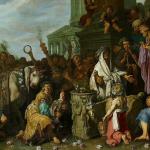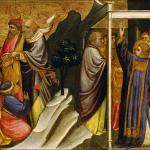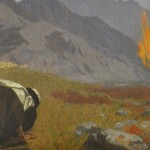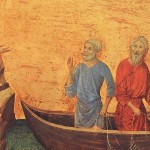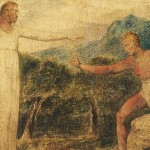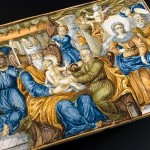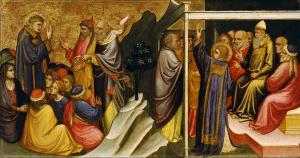 Acts 7:1-16
Acts 7:1-16
When Stephen was accused by the Jews of blasphemous words against the Temple and the Law, how did Stephen defend himself?
I’ll tell you what he didn’t do. He didn’t try to offer scientific proof that Jesus rose from the dead. He could have done something like that. He could have begun by mentioning all of the eyewitnesses of the resurrection or making neatly argued syllogisms about the resurrection from the Old Testament. Or He could have marshaled all of the prophecies in the Old Testament that pointed forward to Christ, made some quick calculations about the probability of each, factored in how many separate prophecies there were and submitted a full report to the Jews. He could have, and it wouldn’t have been wrong.
What he actually did was to tell a story: his story, their story, and our story. In this postmodern age, in which people like stories better than facts, I think we would all do well to learn our own story, the story of God and His salvation, better. This is important not only so we can speak the Gospel in love to our neighbors in a way that they can hear but also for our own benefit.
Stephen chose to tell the story of God and the Jews with two focal points in mind, which he blends together in the end. The major theme of the story is how God sovereignly and graciously dealt with His people. But as Stephen closes in for the kill, it becomes evident that one aspect of this theme is how the children of Israel had a bad habit of resisting God. At the climax of his sermon, he brings in Jesus Christ. You, he says to his listeners, you are stiff-necked just like your forefathers, only you didn’t just resist God: you killed Him!
The story may be told in different ways, depending on the needs of the audience. Because you and I (hopefully!) are not stiff-necked Israelites, the way we need to hear the story today should be different. Here is the way I’d like to tell it today.
“Brothers and sisters, listen: The God of glory created our father Adam and placed Him in His garden. He gave him Paradise, a land flowing with milk and honey, and He dwelt with Adam. But Adam became stiff-necked and went his own way, and God said to him, “Get out of the country I have given you, and go to a land outside of Eden that I will show you.’ God moved him out of the Promised Land, and judged him but promised ever so quietly one who would crush the Serpent’s head.
Then God appeared to our father Abraham when he was in Mesopotamia, before he dwelt in Haran, and said to him, ‘Get out of your country and from your relatives, and come to a land that I will show you. God moved him to the land of Israel, the Promised Land. But God gave him no inheritance in it, not even enough to set his foot on. But even when Abraham had no child, He promised to give it to him for a possession, and to his descendants after him. But God spoke in this way: that his descendants would dwell in a foreign land, and that they would bring them into bondage and oppress them four hundred years. Then He gave Him the covenant of promise, the covenant of circumcision.
And Abraham begot Isaac, and Isaac begot Jacob, and Jacob begot the twelve patriarchs. But the patriarchs, becoming envious, sold Joseph into Egypt. But God was with him and delivered him out of all his troubles. And Jacob saved Israel in Egypt, but there arose a pharaoh who knew not Joseph, and Israel was oppressed by Egypt. But God raised up Moses to deliver Israel, and through him gave the Law.
Joshua, or Jesus, led the people into the Promised Land, and the people were ruled by the judges for a period of time until they demanded a king from God. Like Israel herself, their first king began by following God but soon departed from Him, and God raised up David, a man after His own heart.
But Solomon, the man of wisdom, became foolish, and his son was a greater fool, and the kingdom of Israel was divided, never again to be reunited. And Judah had few good kings, and Israel even fewer, and the people of God ended up where their father Adam had left them: in captivity and outside of the Promised Land.
But the God of glory appeared again to His people, this time in the person of His Son. Jesus, the new Moses, wrote the Law on the hearts of His people, and Jesus, the new Joshua, led His people back into the Promised Land. He took upon Himself all of the sins and stiff-neckedness of His people, from Adam until the end of time.
This is the Just One of whom the Jews became the murderers and betrayers. And though I, too, was one of those murderers and betrayers, He died for me. Through my forefather Adam I was a sinner and joined in the murder of Jesus Christ. But by the grace of God I was born again into the family of faith and baptized into the New Covenant which is Jesus Christ Himself. By Him, I have been counted righteous and made holy. My stiff neck has been healed, and my stony heart replaced with a heart of flesh, upon which He has written His Law. His Holy Spirit has made me His dwelling place not made with human hands.”
This is my story, which is His story, because His life has become my life. When you hear it, therefore, because it is also your story, do not receive it with envy and hatred as the Jews received Stephen’s story, but receive it instead with joy and thanksgiving!
Prayer: Thanks be to You, O Father, who gives us the victory through our Lord Jesus Christ! Thanks be to You, O Son, for Your indescribable gift! Thanks be to You, O Spirit, who always lead us in triumph in Christ, and through us diffuses the fragrance of Your knowledge in every place! Amen.
Point for Mediation: Tell your own story. You may want to tell it in relation to the story of God’s people before you, or you may want to tell it from the beginning of your life.
Resolution: I resolve, after having rehearsed my story, to keep an attitude of joy and thanksgiving throughout the day today.
St. Stephen Preaching – U.S. Public Domain

